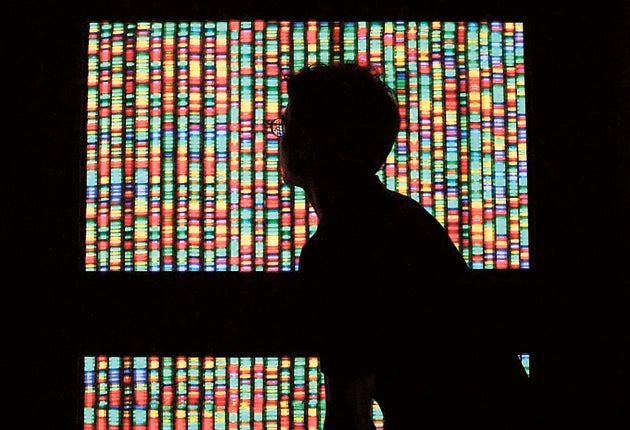The man who discovered his family secrets – via his DNA
Greg Lucier, who has devoted his career to genetics, was shocked by what his own profile revealed, he tells Jeremy Laurance

Technology set to transform medicine has already changed the life of the man leading its development. Greg Lucier, chief executive of Life Technologies, the Californian company that makes machines for reading the human genome, decided to "see what it would be like" to have his genetic profile analysed – and uncovered hidden facts about his family's health.
In his late forties, Mr Lucier discovered he was carrying a mutation of an unusual form of Parkinson's disease, a degenerative disorder with no cure. Subsequent testing of his mother, Anne, 79, who had been suffering from an ailment labelled "multiple systems atrophy", established that she, too, had the mutation – and also Parkinson's.
That was not all. When his genome was sequenced in June of last year Mr Lucier discovered he had a mutation linked with breast cancer. While that poses little risk to him, if his wife also carries it and his 15-year-old daughter has inherited it from both her parents, she will be at high risk of breast cancer. Unlike Parkinson's, breast cancer can be dealt with through screening, early diagnosis and prompt treatment. Sequencing his daughter's genome could save her life by ensuring she undergoes early and regular mammographic screening.
Mr Lucier said: "When I found out I had the mutation for Parkinson's I knew it typically develops later in life and it was only a probability I would get it. I wasn't going to worry."
The family wanted to know what was wrong with his mother and she submitted to the test willingly, because she was interested in the technology and what it could do.
"My mother is a very curious woman. She is late in life and recognises there is no cure for Parkinson's but her whole psychology is to help the next generation. This is about humanity for her." She is shortly to undergo brain scans and have stem cells extracted to assist the research effort.
His father declined a test, though he has consented to have his cells preserved for analysis after his death. "He is a very fatalistic fellow. He said to me: 'Presume the worst case scenario – would [knowing about it] make any difference?'"
Learning whether his father carried the same mutation as his mother and himself "would have added a lot" in helping to calculate his own risk. But assuming the worst was just as good a basis for any decisions, he said. Genetic profiling offers patients personal risk analyses, predicting their chance of developing diseases, and enables doctors to tailor treatments to their genetic inheritance. Critics argue that there is questionable benefit, and that there may be harm, in learning you are at high risk of a terminal disease. The prospect of living under such a threat, possibly for decades, leads some to reject gene testing.
But Mr Lucier points to the second discovery he made – of the mutation for breast cancer – as evidence of the immediate benefits the technology could bring. "If my daughter carries breast cancer mutations from both her parents then she needs to get early mammography. That is an example where there is action that can be taken now that is clearly of benefit."
The cost of DNA sequencing is plunging and its speed accelerating. Mr Lucier says his billion-dollar company already has the kit to produce an affordable $1,000 (£600) genome which will be on the market "within 12 months". The first complete human genome produced a decade ago cost $3bn.
The technology will allow doctors to adapt treatments to fit the genetic profile of the patient and of the disease, introducing "personalised medicine" with higher success rates. A drawback is that patients who might be suitable for treatment with the new targeted drugs must first be tested to see if they have the right genetic profile – and the tests add to the expense.
Mr Lucier says cancer treatment is the key area in which genetic profiling could bring immediate benefit. Pilot schemes to introduce genetic testing of tumours is to be rolled out next month in seven British hospitals by Cancer Research UK. The next step would be genetic profiling of patients.
"If you have a cancer today you need to get your genome sequenced. It will allow doctors to understand what is driving the cancer and what may be done in the way of treatment. Drugs for cancer work in only one in five patients and they cost tens of thousands of dollars. Our understanding is increasing at an incredible pace. This is how medicine is going to change."
Join our commenting forum
Join thought-provoking conversations, follow other Independent readers and see their replies
Comments